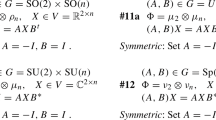Abstract
Probabilistic theories are a natural framework to investigate the foundations of quantum theory and possible alternative or deeper theories. In a generic probabilistic theory, states of a physical system are represented as vectors of outcomes probabilities and state spaces are convex cones. In this picture the physics of a given theory is related to the geometric shape of the cone of states. In quantum theory, for instance, the shape of the cone of states corresponds to a projective space over complex numbers. In this paper we investigate geometric constraints on the state space of a generic theory imposed by the following information theoretic requirements: every non completely mixed state of a system is perfectly distinguishable from some other state in a single shot measurement; information capacity of physical systems is conserved under making mixtures of states. These assumptions guarantee that a generic physical system satisfies a natural principle asserting that the more a state of the system is mixed the less information can be stored in the system using that state as logical value. We show that all theories satisfying the above assumptions are such that the shape of their cones of states is that of a projective space over a generic field of numbers. Remarkably, these theories constitute generalizations of quantum theory where superposition principle holds with coefficients pertaining to a generic field of numbers in place of complex numbers. If the field of numbers is trivial and contains only one element we obtain classical theory. This result tells that superposition principle is quite common among probabilistic theories while its absence gives evidence of either classical theory or an implausible theory.
Similar content being viewed by others
References
Hardy, L.: Quantum theory from five reasonable axioms. arXiv:quant-ph/0101012
Dakic, B., Brukner, C.: Quantum theory and beyond: is entanglement special? In: Halvorson, H. (ed.) Deep Beauty: Understanding the Quantum World through Mathematical Innovation, pp. 365–392. Cambridge University Press (2011). arXiv:0911.0695
Masanes, L., Mueller, M.P.: A derivation of quantum theory from physical requirements. New J. Phys. 13, 063001 (2011). arXiv: quant-ph/1004.1483
Chiribella, G., D’Ariano, G.M., Perinotti, P.: Probabilistic theories with purification. Phys. Rev. A 81, 062348 (2010). arXiv:quant-ph/0908.1583
Chiribella, G., D’Ariano, G.M., Perinotti, P.: Informational derivation of quantum theory. Phys. Rev. A 84, 012311 (2011). arXiv:quant-ph/1011.6451
Hardy, L.: Reformulating and reconstructing quantum theory. arXiv:1104.2066
Hardy, L.: Towards quantum gravity: a framework for probabilistic theories with non-fixed causal structure. J. Phys. A 40, 3081 (2007). arXiv:gr-qc/0608043v1
Barret, J.: Information processing in generalized probabilistic theories. Phys. Rev. A 75, 032304 (2007). arXiv:quant-ph/0508211
Hardy, L., Wooters, W.K.: Limited Holism and real-vector-space quantum theory. arXiv:1005.4870
Janotta, P., Lal, R.: Generalized probabilistic theories without the no-restriction hypothesis. Phys. Rev. A 87, 052131 (2013)
Mueller, M.P., Oppenheim, J., Dahlsten, O.C.O.: The black hole information problem beyond quantum theory. J. High Energy Phys. 2012(9), 116 (2012)
Masanes, L., Mueller, M.P.: Three-dimensionality of space and the quantum bit: an information-theoretic approach. New J. Phys. 15, 053040 (2013)
Barnum, H., Wilce, A.: Post classical probability theory. In: Chiribella, G., Spekkens, R.W. (eds.) Quantum Theory: Informational Foundations and Foils. Springer. arXiv:1205.3833
Perinotti, P.: Discord and non-classicality in probabilistic theories. Phys. Rev. Lett. 108, 120502 (2012)
Mueller, M.P., Ududec, C.: The structure of reversible computation determines the self-duality of quantum theory. Phys. Rev. Lett. 108, 130401 (2012)
D’Ariano, G.M., Tosini, A., Manessi, F.: Spooky action at a distance in general probabilistic theories. Phys. Lett. A 376, 2926–2930 (2012)
Janotta, P., Gogolin, C., Barrett, J., Brunner, N.: Limits on nonlocal correlations from the structure of the local state space. New J. Phys. 13, 063024 (2011)
Abramsky, S.: Relational hidden variables and non-locality. Stud. Log. 101(2), 411–452 (2013)
Masanes, L., Mueller, M.P., Augusiak, R., Perez-Garcia, D.: Existence of an information unit as a postulate of quantum theory. PNAS 110(41), 16373 (2013)
D’Ariano, G.M., Tosini, A.: Testing axioms for quantum mechanics on probabilistic toy-theories. Quantum Inf. Process. 9, 95–141 (2010). arXiv:0911.5409
Janotta, P., Hinrichsen, H.: Generalized probability theories: what determines the structure of quantum theory? J. Phys. A 47, 323001 (2014)
Cohn, P.M.: Encyclopedia of Mathematics and its Applications, Skew Fields: Theory of General Division Rings. Cambridge University Press, Cambridge (1995)
Casse, R.: Projective Geometry: An Introduction. Oxford University Press, Oxford (2006)
Fivel, D.: Derivation of the rules of quantum mechanics from information-theoretic axioms. arXiv:1010.5300
Veblen, O., Young, J.W.: A set of assumptions for projective geometry. Am. J. Math. 30(4), 347–380 (1908)
Veblen, O., Young, J.W.: Projective Geometry, vol. I. Ginn and Co., Boston (1910)
Veblen, O., Young, J.W.: Projective Geometry, vol. II. Ginn and Co., Boston (1917)
Zaopo, M. to be published
Chang, Nam: L., Lewis, Z., Minic, D., Takeuchi, T.: Quantum fun: the \(q = 1\) limit of galois field quantum mechanics, projective geometry and the field with one element. J. Phys. A 47, 405304 (2014)
Author information
Authors and Affiliations
Corresponding author
Rights and permissions
About this article
Cite this article
Zaopo, M. Information Theoretic Characterization of Physical Theories with Projective State Space. Found Phys 45, 943–958 (2015). https://doi.org/10.1007/s10701-015-9910-9
Received:
Accepted:
Published:
Issue Date:
DOI: https://doi.org/10.1007/s10701-015-9910-9




